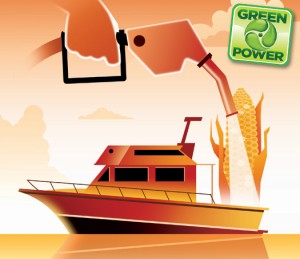Ethanol Presents Unique Boating Quandary

You might remember ethanol from chemistry class. The colorless fluid, derived from corn, is occasionally used for flammability demonstrations in American schools. Lately the substance has come under fire in a figurative sense as well, having the sparked the rage of some boating enthusiasts. Ethanol-based fuels, marketed as E10 or E15 depending on its actual blend, have been known to do serious damage to fuel tanks and lines.
But corn lobbyists, who are appealing to the Environmental Protection Agency about the dangers of standard outboard oil, would like to turn the ethanol debate into an environmental litmus test. Although their claims that ethanol reduces dependency on fossil fuels – however slightly – is true, this viewpoint fails to take the consequences into account. As a solvent, ethanol dissolves rubber and absorbs water, gumming up a boat’s fuel system.
While E10 is not necessarily detrimental to car fuel tanks, which are filled and emptied at a rapid clip, the same is not true for boat tanks. A boat might sit for weeks or even months at a time without use, and any dormant ethanol inside will eat away slowly at the fuel system. For the time being, most boaters agree that traditional marine engine oil still works best, especially since it has been reformulated for better efficiency and eco-friendliness.

